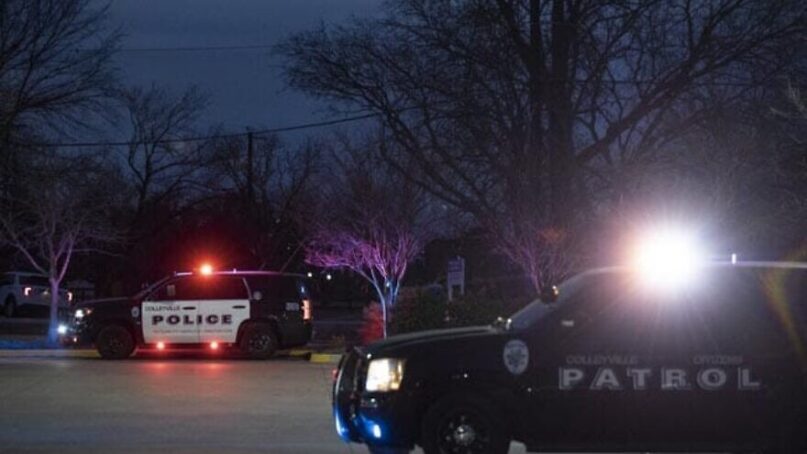
(JNS) “I’m grateful to be alive,” wrote Rabbi Charlie Cytron-Walker on Facebook shortly after he emerged unscathed from his Texas synagogue, where he was held hostage for nearly 11 hours, along with three congregants. “I am grateful that we made it out.”
The world watched in shock on Saturday as yet another anti-Semitic incident threatened to take the lives of innocent people—their only crime praying in their synagogue. The crisis highlighted once again the striking rise in anti-Semitism in recent decades—54.9 percent of all hate crimes in 2020 were against Jews, according to the Federal Bureau of Investigation—and the need to beef up security in the U.S. Jewish community.
On Sunday, the FBI named Malik Faisal Akram, a 44-year-old British citizen, as the perpetrator. Akram was shot dead by an FBI SWAT team, ending the standoff and leading to the release of the final three hostages.
“Not again,” was Rabbi David Glickman’s first thought as he learned of the hostage crisis at Congregation Beth Israel in Colleyville, about 30 miles northwest of Dallas. The Kansas rabbi said the incident brought back painful memories of the 2014 anti-Semitic shooting attacks in his own community, which killed three people, traumatized the small Jewish community and forced it to step up security presence at its Jewish Community Center, synagogues and day school.
Glickman told JNS that the incident “brings home that the Jewish community tragically needs to put a disproportionate number of resources into simply being able to worship safely” and that “I unfortunately fear that this will add one more reason for Jewish people to be afraid to go to synagogue.”
By late Saturday, after a nearly 11-hour standoff, all four hostages, including Cytron-Walker, had been released safely with no physical injuries, local and federal law enforcement said. The man responsible, who reportedly said he was acting to free a federal prisoner being held in North Texas who was convicted more than 10 years ago of attempted murder in a terrorism-related case, was dead. The details are still unclear.
The Saturday morning service was being livestreamed on Facebook. On a video that has since been removed from the social network, a man—presumably the attacker—can be heard speaking angrily and cursing.
The woman the hostage taker claimed to be acting on behalf of is Aafia Siddiqui, who was convicted in 2010 of attempting to kill U.S. service members in Afghanistan. She is imprisoned at FMC Carswell, a federal prison in Fort Worth. However, authorities have said they believe this was a lone-wolf attack.
“This situation appears to be local and isolated,” the Secure Community Network (SCN), the official safety and security organization of the Jewish community in North America, said in a statement. “SCN is not aware of any direct, credible threats to any other institutions.”
‘We are living in dangerous times’
The Jewish and Israeli communities, as well as local, national and international leaders, followed the situation closely, saying prayers for the hostages throughout the crisis. As the Jewish community breathed a collective sigh of relief following the incident’s safe conclusion, many reacted calling for greater vigilance, stressing the need for the community to further protect itself.
“We are living in dangerous times,” said World Jewish Congress president Ronald S. Lauder. “This latest attack is proof that we cannot afford to become complacent. We must continue to tackle this age-old hatred head-on.”
CEO of the Conference of Presidents of Major Jewish American Organizations, Willliam Daroff, told JNS that it is “incredibly distressing to think about the fact this could be any single synagogue in America and could be any of us, any of our rabbis or any of our children in Jewish schools.
“It is a reality of the times we live in that there is danger from the far-left, the far-right and Islamic extremists,” he said.
Both U.S. President Joe Biden and Israeli Prime Minister Naftali Bennett were briefed on the situation and followed it throughout the day in America and the night in Israel.
Upon its conclusion, Biden disseminated a statement saying that while “there is more we will learn in the days ahead about the motivations of the hostage-taker … let me be clear to anyone who intends to spread hate—we will stand against anti-Semitism and against the rise of extremism in this country. That is who we are, and tonight, the men and women of law enforcement made us all proud.”
Bennett, too, expressed solidarity with the American Jewish community in his remarks at the weekly cabinet meeting. He said, in English, that “you are not alone. We are one family and we stand strong and united together.”
Diaspora Affairs Minister Nachman Shai said that Israel needs to do more to fight rising extremism. “What we are doing now is far from efficient,” he told JNS.
He also stressed that the crisis should be “nothing less than anti-Semitism” since it occurred at a synagogue. “The target was Jewish, and no one can hide it,” said Shai. “Why a shul and not a supermarket across the street? He knew where he was going.”
Texas law enforcement agencies worked closely with the FBI throughout the incident, alongside SCN and the Anti-Defamation League, both of which also arrived on the scene.
Daroff said that law enforcement had acted “quickly and efficiently and effectively.”
“Today, the government is there to protect us, and we have had great engagement with federal law enforcement, local law enforcement and various officials in the Biden administration throughout this crisis,” Daroff told JNS.
He added that additionally, the synagogue had received training only several months prior by SCN, which likely helped to make them better prepared for the situation. This, he added, “also speaks to how [much] further along we are as a community in dealing with this rising tide of hate.”
“We are doing our part, synagogues are receiving training and the government is working with us to harden our Jewish communal facilities,” he said.
Security an ongoing cost for the Jewish community
SCN is a program of the Jewish Federations of North America (JFNA). Its president, Eric Fingerhut, told JNS that since 9/11 the federation has been “undertaking a campaign to build out strong security networks in every Jewish community because we know these types of things are going to continue to happen and even increase.”
He said that each local Jewish community is approaching the situation slightly differently, but what is consistent is the standards. Some communities are raising annual funds, some endowment funds, he said, but “everybody is deeply involved. This is a permanent, ongoing cost that is not going away.”
According to the most recent report by the American Jewish Committee (AJC), which was published in October 2021, one in four American Jews said that they were targets of anti-Semitism in the previous 12 months, and the same number had personally witnessed anti-Semitic incidents.
Some 82% of American Jews say anti-Semitism has risen over the last five years, according to the report.
From the Tree of Life attack in 2018 to the Poway synagogue attack six months later, and incidents in New Jersey, Brooklyn and more—“I cannot even list them all anymore,” said Fingerhut. “The number is quite significant.”
Daroff said that while the Jewish community needs to work to physically harden its buildings, it must also work to reduce anti-Semitism and hate speech in the United States.
Education and engagement are required to “try to break down some of the features that inspire anti-Semitism,” said Daroff.
He stressed the need for the public to call out the various canards, memes and fictions that “allude to Jews and our alleged responsibility for just about every conspiracy there is out there,” especially anti-Semitic statements shrouded in anti-Israel rhetoric.
Glickman said that American rabbis were not trained in rabbinical school to think about security cameras in their parking lots, how many people need to be in a building to hire a police officer or whether guards should be armed or not.
“Let’s not forget that the Overland Park shooting happened during the Obama administration,” he told JNS. “It does not matter which party is in the White House. While we are blessed that we have unprecedented protection from the government, that we have never had in Jewish history and we should not take that for granted, I think it would be foolish for us to not also look out for our own protection.”
Security, he added, “is one of those factors where the collective Jewish community needs to take a strong role.”
He said it costs a minimum of $100 per Shabbat to hire an off-duty police officer or a security guard for Shabbat morning services and often more.
“How sad that a smaller synagogue that is either serving very young people or very old people has to make a choice between hiring a youth adviser or a security guard, but these are the choices that synagogues are making,” said Glickman.
At the same time, he added that while anti-Semitism will continue to wax and wane, it should not be the reason for Jewish living. Instead, he said that Kansas, Pittsburg, California, and now, Texas—as well as the entire American Jewish community—should focus on positive Jewish living and embracing Jewish life.
“We need to find ways to come back together and celebrate,” said Glickman, “to learn Torah and comfort one another and that is what will keep us strong even if anti-Semitism disappeared tomorrow.”








 Southern New England Jewish Ledger
Southern New England Jewish Ledger














